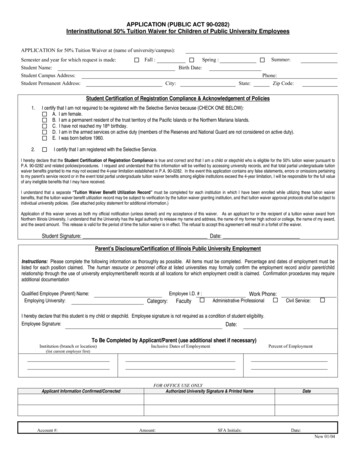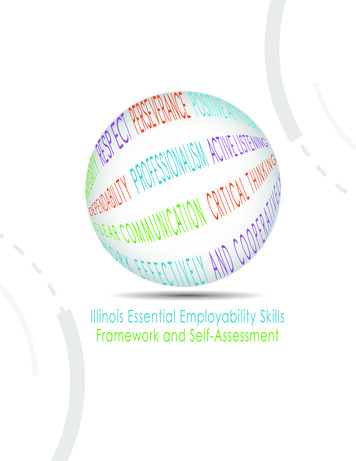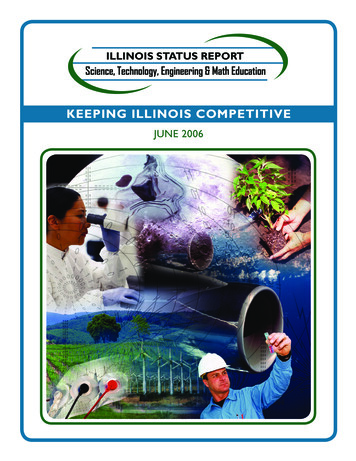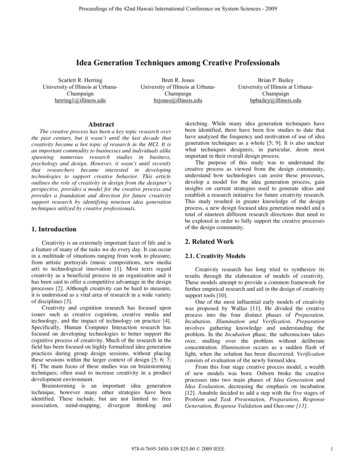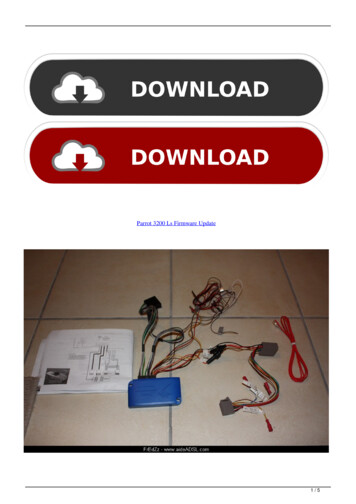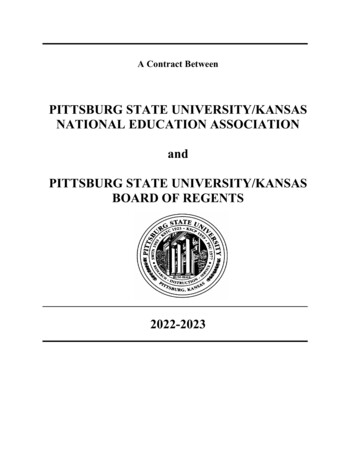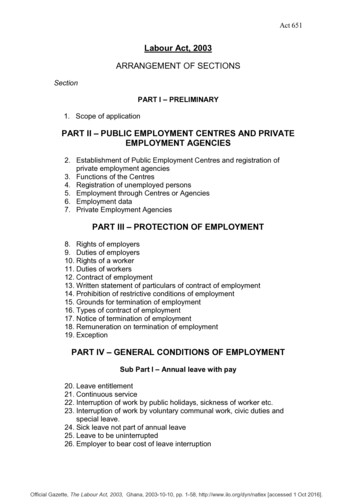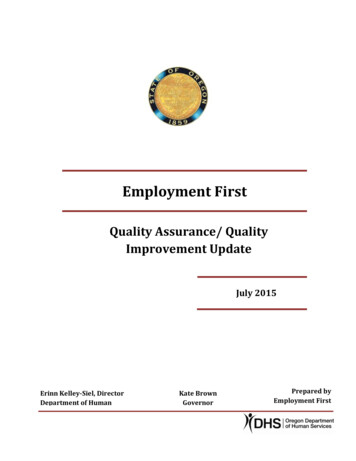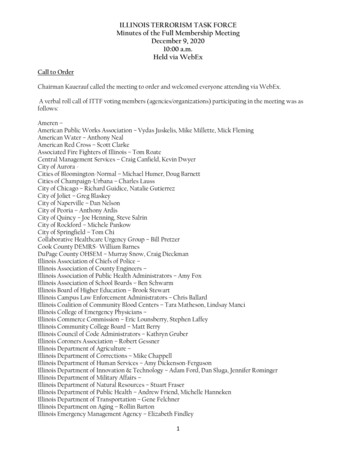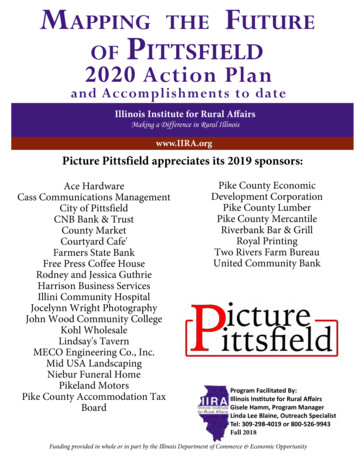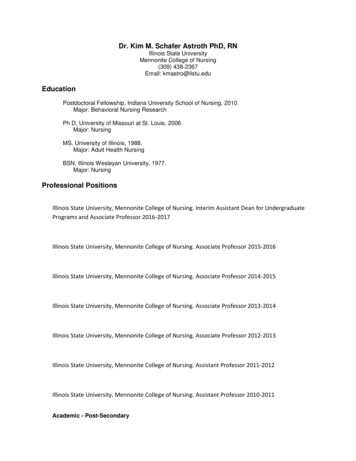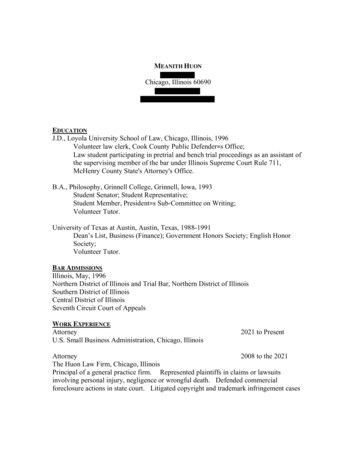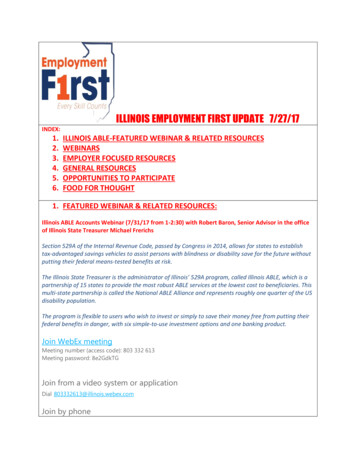
Transcription
ILLINOIS EMPLOYMENT FIRST UPDATE 7/27/17INDEX:1.2.3.4.5.6.ILLINOIS ABLE-FEATURED WEBINAR & RELATED RESOURCESWEBINARSEMPLOYER FOCUSED RESOURCESGENERAL RESOURCESOPPORTUNITIES TO PARTICIPATEFOOD FOR THOUGHT1. FEATURED WEBINAR & RELATED RESOURCES:Illinois ABLE Accounts Webinar (7/31/17 from 1-2:30) with Robert Baron, Senior Advisor in the officeof Illinois State Treasurer Michael FrerichsSection 529A of the Internal Revenue Code, passed by Congress in 2014, allows for states to establishtax-advantaged savings vehicles to assist persons with blindness or disability save for the future withoutputting their federal means-tested benefits at risk.The Illinois State Treasurer is the administrator of Illinois’ 529A program, called Illinois ABLE, which is apartnership of 15 states to provide the most robust ABLE services at the lowest cost to beneficiaries. Thismulti-state partnership is called the National ABLE Alliance and represents roughly one quarter of the USdisability population.The program is flexible to users who wish to invest or simply to save their money free from putting theirfederal benefits in danger, with six simple-to-use investment options and one banking product.Join WebEx meetingMeeting number (access code): 803 332 613Meeting password: 8e2GdkTGJoin from a video system or applicationDial 803332613@illinois.webex.comJoin by phone
1-415-655-0002 US TollGlobal call-in numbersCan't join the meeting? LEAD Focuses on the Connection between the ABLE Act and EmploymentThis past quarter, the LEAD Center conducted substantial work to educate disability-relatedstakeholders about how having an ABLE account can assist a person with obtaining and maintainingcompetitive integrated employment.Continue reading "LEAD Focuses on the Connection between the ABLE Act and Employment " LEAD PARTNER: ABLE National Resource CenterTo celebrate The ABLE National Resource Center (ANRC) is a collaborative that brings together theinvestment, support, and resources of some of the country's most influential national disabilityorganizations to accelerate the design and availability of ABLE accounts. Founded and managedby National Disability Institute (NDI), ANRC's goal is to provide consistent, reliable informationconcerning the benefits of an ABLE account. ABLE accounts, created as a result of the Achieving a BetterLife Experience Act of 2014 (ABLE Act), are tax-advantaged savings accounts for eligible individuals withdisabilities.Continue reading "LEAD PARTNER: ABLE National Resource Center " The ABLE Act and Employment: Strategies for Maximizing the Effectiveness of the Achieving aBetter Life Experience (ABLE) Act as a Tool for Financial Stability and Employment Outcomes ofPeople with Disabilities2. WEBINARS: Webinar: Exploring and Involving a Person’s Circle of Support to Improve Their Health andRecoveryJuly 26, 20173:00 - 4:30 PM EDT
Presenters Tony Salerno, PhD, National Council for Behavioral Health Barbara Green, PSA Behavioral Health AgencyRegister for free at: https://goto.webcasts.com/starthere.jsp?ei 1152858&tp key 40d982793bExploring and involving a member of a client or patient’s social network requires skills that are often nottaught in school. Join the SAMHSA-HRSA Center for Integrated Health Solutions for a webinar on July 26,2017 that will provide an overview of the steps involved in the ‘Consumer Centered Family Consultation(CCFC)’ approach and the tools available to support staff.CCFC, which is rooted in principles of recovery, is an easy to use approach that assists staff to engageconsumers in identifying: Who they would like to assist them with achieving a specific recovery or wellness goal How to reach out and invite the family or another person in the consumer’s network toa session How to successfully facilitate a session with the consumer, the identified support personand the staff person.In this webinar, participants will:1. Recall why family support is important2. Identify the 3 phases of the Consumer Centered Family Consultation (CCFC) approach3. Identify their next steps to implement a consumer’s circle of supportPlease note the following: Registration is free and closed captioning is available upon request. The audio for this webcast is via computer speakers and not telephone. We recommend usingexternal speakers for desktop computers to ensure best audio quality. Test your system here The SAMHSA-HRSA Center for Integrated Health Solutions does not provide certificates ofattendance or continuing education credits for webinar attendance. Peer Support – Then and NowFriday, July 28(12:00 ET 11:00 CT 10:00 MT 9:00 PT)Beth Filson: iNAPS Executive Consultant
Beth Filson joins iNAPS as Executive Consultant this year. Her experience developing the peer work forcespans nearly sixteen years. In this webinar, she will provide a long-distance view from the early days ofpeer support work when Georgia was the first state to win Medicaid approval for peer services, to thepresent day proliferation and recognition of peer support on the international stage. Peer supportcontinues to evolve and grow, and with it, a new understanding of what makes peer support unique,and its power to aid in healing.Click here to join the Webinar on Friday, July 28(12 Noon Eastern 11 CT 10 MT 9 PT)Meeting number: 318 791 587Meeting password: optum(No pre-registration required) The Role of Lived Experience in Dismantling Collateral Consequences Caused by IncarcerationDate: Tuesday, August 1, 2017 1:00 to 2:30 PM CDTWhen programs and policymakers include the voices of those whom they serve and directlyimpact, their decision-making processes and policies are more inclusive, comprehensive, andimpactful. Our upcoming webinar will lift up how different organizations are partnering with andlearning from people with lived experience to drive policy and systems change in criminal justicereforms related to employment, housing, and other collateral consequences of incarceration.Register Here ADA Live! Emergencies: How to Prepare for Them and What to DoAfterwardsThe NIDILRR-funded Southeast ADA Regional Center will host a webcast, Emergencies:How to Prepare for Them and What to Do Afterwards, August 2nd, 1-1:30pm ET, the latestepisode in the ADA Live! series. Presenters will discuss what anyone should do in anemergency, and specifically what people with disabilities should do before, during, and afteran emergency. No registration is required and questions may be submitted in advance.
Diversity & Inclusion in Faith CommunitiesMeeting Description:Is there a need to consider diversity and inclusionstrategies in the faith community? Diversity andinclusion has increasingly become a focal point forbusinesses, educational institutions and serviceorganizations.During this webinar we will discuss the following: How diversity represents the variouscombinations of human difference, e.g.,learning styles, life experiences, race/ethnicity,gender, political, national origin and otherfactors. The importance of inclusion in faithcommunities which includes the active,intentional on going engagement withdiversity, i.e., employment, service, othersystems.Regardless of the definition of faith community –denomination, church, synagogue, mosque or someother format or expression of faith – diversity andinclusion factors play a critical role.Organizations are made up of a diverse group ofindividuals from different cultural backgrounds,socioeconomic levels, educational levels, abilities, etc.The spiritual leader of the organization along withother leaders/workers and the individual members ofthe organization carry a set of conscious andunconscious biases, thoughts and feelings aboutothers within the group and outside of the group. Thiscan impact the organization as well as the lifeexperiences of individuals within that faith communityin a positive and or negative manner.Diversity and inclusion is animportant element in the success andexperiences of all faith communities.Rev. Deborah Burris, M. Div.Diversity ConsultantDetailsDate:Wed, Aug 9, 2017Time:10:30 AM CDTDuration: 1 hourHost(s):Jermine AlbertyPresenter InformationRev. Deborah Burris, M. Div.About Rev. Deborah Burris, M. Div.Rev. Deborah J. Burris earned herMaster Divinity from Eden Seminaryand is the Chief Diversity Officer at theUniversity of Missouri – St. Louis.In this capacity, she providesadministrative leadership for equalopportunity and diversity for UMSLand counsels the chancellor, senioradministrators, faculty, staff andstudents concerning equalopportunity issues.She brings to her position over 30years of higher education experienceworking in student development,human resources and equalopportunity/diversity administration.Advancing opportunities for womenand other underrepresented groupshas been at the core of her career.She currently serves as co-chair of theChancellor’s Cultural Diversity Council.Ms. Burris earned a Master ofEducation in Educational Leadership &Policy Analysis from the University ofMissouri Columbia and anundergraduate degree from St. LouisUniversity in OrganizationalDevelopment.
or click here to register PEAT Talks: Making Tech Fields AccessibleThursday, August 17, 2pm-3pm ET WEBINAREvoXLabs founder Ather Sharif will discuss his experiences in making tech-focused workplaces moreinclusive, from building technology solutions to how and why EvoXLabs developed a partnership withAccess Computing at UW that connects students with disabilities with mentors and internships in tech.Register Now Evidence-Based Strategies for Serving Jobseekers and Workers with Disabilities and ChronicHealth ConditionsRegister NowHuman services and workforce development programs have a critical role to play in supporting workfor people with disabilities and chronic health conditions. Fortunately, there are many evidencebased strategies for helping these clients prepare for, attain, and retain employment. This webinarwill highlight three such strategies being implemented in Washington and North Carolina.The Washington Department of Social and Health Services is piloting a Supported Employmentprogram which assists individuals with mental illness in choosing, acquiring, and maintainingcompetitive employment. Because this pilot uses braided funding of both TANF and non-TANF, jobcoaches can continue to support the client after the job has started - for as long as they are needed.Researchers at the University of North Carolina have partnered with local human services agenciesto show how public health nursing interventions can improve employment outcomes for job seekersand low-wage workers with chronic health conditions.North Carolina’s Department of Health and Human Services has implemented Project SEARCH, astrong evidence-based model for transitioning youth with disabilities into competitive employment,within its own department.Presenters:Tarimah Williams, TANF/WorkFirst Program ManagerEconomic Services Administration’s Community Service Division (CSD)Washington Department of Social and Health ServicesMelodie Pazolt, Recovery Support Services SupervisorBehavioral Health AdministrationWashington Department of Social and Health ServicesAlice Farrar, Interim Chief of Employment Services and Program DevelopmentNorth Carolina Department of Health & Human Services’ Division of Vocational RehabilitationShawn Kneipp, Associate ProfessorUNC at Chapel Hill’s School of Nursing
Thursday, August 24th3:00 - 4:30 pm ETBrought to you by:The American Public Human Services Association Thursday, September 14, 1:00 – 2:00 p.m. ETWebinar: Creating Inclusive Higher Education Work Environments for People with Mental HealthDisabilitiesIn the higher education workplace environment, policies and practices that support success for facultyand staff with mental health conditions are also sound management practices that benefit all workersand employers. During this webinar, hosted by EARN in collaboration with the Higher EducationRecruitment Consortium (HERC), a panel of experts will explore this issue in depth. While geared towardhigher education, the content that will be shared is widely applicable, and employers in all industries areencouraged to participate. Register for the September 14 webinar.ARCHIVED: Diversity Partners June 29, 2017 webinar archive available now.“INCLUDING JOB SEEKERS WITH DISABILITIES IN THE WORKFORCE DEVELOPMENT SYSTEM:IMPLEMENTING SECTION 188”LISTEN TO THE WEBINAR HEREThe Workforce Innovation and Opportunity Act (WIOA) has presented a new challenge toworkforce development professionals: affirmatively recruit and offer services to more job seekers withdisabilities. This webinar highlights information from the Diversity Partners online modules that can helpworkforce development professionals achieve greater inclusion of job seekers with disabilities. Listen tothe requirements of Section 188, and review strategies for building a more inclusive workforcedevelopment system at the local level.
Learn more about Diversity Partnersat www.buildingdiversitypartners.orgThe contents of this project were developed under a grant from the National Institute on Disability,Independent Living, and Rehabilitation Research. NIDILRR is a Center within the Administration forCommunity Living (ACL), Department of Health and Human Services (HHS). The contents of thispresentation do not necessarily represent the policy of NIDILRR, ACL, HHS, and you should not assumeendorsement by the Federal Government. Copyright 2016 Cornell University. EFSLMP Communications and Branding Strategies For Transition to CIE.If you were unable to join, you can view it here. Meeting materials can be downloaded from the webinarrecording. The unofficial transcript can be found here. The CMS Medicare-Medicaid Coordination Office (MMCO), in collaboration with The LewinGroup and SAMHSA-HRSA Center for Integrated Health Solutions (CIHS), is excited toannounce an upcoming webinar:Tools to Support Clients with Self-ManagementGoal-setting through action planning, a key element of self-management support (SMS), includesworking with clients and their natural supports to formulate short-term objectives for their health anddevelop specific steps for crisis management.This webinar will explore how behavioral health organizations and providers can implement SMS withtheir clients using action planning. Participants will review Resources for Integrated Care’s Action PlanSelection Guide along with other tools and models for supporting self-management. Following thiswebinar, participants will be able to:1. Define the key elements of action planning with clients to promote self-management;2. Identify different evidence-based self-management tools, including the Wellness RecoveryAction Plan (WRAP) and the Whole Health Action Management (WHAM) program; and3. Support conversations with clients on the self-management of chronic conditions and mentalillness using RIC client handouts.Featured Speakers: Larry Fricks, Deputy Director, SAMHSA-HRSA Center for Integrated Health Solutions Matthew Federici, WRAP Facilitator, Copeland Center for Wellness and Recovery Ellen Hochberg, CRSS, WRAP Facilitator, Thresholds, Inc. Alexis Estomin, Resources for Integrated Care, The Lewin GroupRecordings of the webinar will be available for online streaming or download athttps://www.resourcesforintegratedcare.com. The Resources for Integrated Care website also featuresadditional resources and tools for providers and health plans.Please contact RIC@lewin.com with any questions3. EMPLOYER FOCUSED RESOURCES:
ASKEARN.ORG SPOTLIGHTReasonable AccommodationsA key component of the Americans withDisabilities Act (ADA) – passed 27 years agothis week – is the concept of reasonableworkplace accommodations. These areadjustments or modifications that enablequalified people with disabilities to perform theessential functions of a job. They may also benecessary to assist a person to apply andinterview for a job. To help employers learnmore, EARN offers a webpage on the basics ofreasonable accommodations, with links tomore in-depth resources.READ MOREEMPLOYERSPOTLIGHTKellogg’sTo help deliver on its commitment to creating awelcoming environment for current and futureemployees with disabilities and their supporters,Kellogg’s has an employee resource group called“Kapable.” In collaboration with company leadership,Kapable seeks to foster a more disability-inclusiveculture through events and other initiatives to increaseunderstanding and encourage dialogue, both internallyand within employees’ local communities.READ MORE. Take the ADA Pledge!The Americans with Disabilities Act (ADA) National Network offers a toolkit of resources thatbusinesses and other organizations can use to observe the ADA anniversary, during July and all yearround. In addition to a listing of featured events, a media kit with downloadable materials, and otherresources, the ADA Anniversary Toolkit offers employers the opportunity to sign a proclamation tobecome part of the nationwide celebration and recommitment to the ADA. Those who take thepledge are publicly recognized on the website by state. Visit the ADA Anniversary Toolkit. CEO Action on Diversity and InclusionLast month, CEOs from more than 150 of the world’s largest corporations collectively committed toadvancing workforce diversity and inclusion and encouraging open discussion about related issueswithin their companies. The initiative, called “CEO Action for Diversity and Inclusion,” entails a pledgeand a database of member company’s efforts around workplace diversity and inclusion, including those
related to people with disabilities. The coalition also plans to hold a summit in the fall to share bestpractices and welcome other companies who have joined the effort. Learn more about CEO Action forDiversity and Inclusion. PEAT Talks: Making Tech Fields AccessibleThursday, August 17, 2pm-3pm ET WEBINAREvoXLabs founder Ather Sharif will discuss his experiences in making tech-focused workplaces moreinclusive, from building technology solutions to how and why EvoXLabs developed a partnership withAccess Computing at UW that connects students with disabilities with mentors and internships in tech.Register Now US Business Leadership Network Conference (USBLN)August 21-24 in Orlando, FL CONFERENCEThe annual USBLN conference focuses on sharing and developing proven strategies for including peoplewith disabilities in the workplace, supply chain, and marketplace. This year's theme “Disability: ACatalyst for Innovation” will celebrate how people and corporations are driving innovation throughdisability inclusion, including several technology-related breakout sessions. UpSkilling Playbook for Employers, Is Upskilling Right for Your Company?,What advantages could upskilling bring to your company? Chapter 5 of the UpSkilling Playbookfor Employers, Is Upskilling Right for Your Company?, offers employers several key factors toconsider when assessing whether to implement an upskilling program. Turnover and retentionrates, recruitment costs, and mission are just a few factors for employers to consider whenassessing the benefits an upskilling program could offer.For more information, read the chapter. Check out the full playbook for more examples ofemployers that have pursued upskilling strategies, investing in economic opportunities forworkers while benefitting their companies at the same time.
Is Upskilling Right for YourCompany?4. GENERAL RESOURCES: NLS Debuts New Website and Pilot ProgramsThe National Library Service for the Blind and Physically Handicapped (NLS) at the Library ofCongress recently debuted their new website - a gateway to the network of library services forpeople who are blind, have low vision, or have physical disabilities. The new website has beendesigned for users with and without visual disabilities, and includes tools to adjust the layout fora range of visual needs. In a recent blog post, NLS Director Karen Keninger also detailed fournew programs currently being piloted at NLS network libraries: duplication on demand, wirelessdownload, synthetic speech, and Braille e-readers. New Research Briefs from the RRTC on Advancing Employment for Individuals with IDDThe NIDILRR-funded Rehabilitation Research and Training Center (RRTC) on AdvancingEmployment for Individuals with Intellectual and Developmental Disabilities (IDD) has publishedtwo new research briefs on findings from the National Core Indicators Adult Consumer Survey of2012-2013. How is Guardianship Status Related to Employment Status for People with IDD?explores whether having a legal guardian can impact the paid employment of people with IDD.What is the Relationship Between Gender and Employment Status for Individuals with IDD?describes some of the demographic differences among people with IDD who responded to thesurvey. 2017 Facts and Figures Factsheets for SCI, TBI, and Burn InjuryThe NIDILRR-funded Model Systems Knowledge Translation Center (MSKTC) has published the2017 factsheets for spinal cord injury (SCI), traumatic brain injury (TBI), and burn injury,produced with the NIDILRR-funded Model Systems data centers. SCI Facts and Figures at aGlance (PDF) was produced with the National SCI Statistical Center. National Database: 2017Profile of People Within the TBI Model Systems (PDF) was produced with the TBI Model SystemsNational Data and Statistical Center. National Database: 2017 Profile of Adults Included in theBurn Injury Model Systems (PDF) and National Database: 2017 Profile of Children Included in theBurn Injury Model Systems (PDF) were produced with the Burn Model Systems Data andStatistical Center. Advocacy Skill Building ToolkitThe NIDILRR-funded Rehabilitation Research and Training Center on Disability in RuralCommunities (RTC: Rural) has released an Advocacy Skill Building Toolkit, a new set of resourcesto conduct workshops that helps develop the advocacy skills of emerging independent livingleaders and youth with disabilities. The toolkit describes how to introduce advocacy through thefacilitation of discussions and unique activities like improvisation, identifying issues ofimportance, and putting advocacy skills into practice. It's Loud Out There: Hearing Health Across the LifespanThe Centers for Disease Control and Prevention (CDC) have posted video and slides from It'sLoud Out There: Hearing Health Across the Lifespan, the June session of the Public Health GrandRounds webcast series. Experts discussed the problem of hearing loss, its causes, prevention
strategies, and public health solutions. In a companion video, Beyond the Data, presentersdiscussed the growth of hearing loss in the US and how it affects younger and older people alike,and shared tips and resources to protect hearing health in an increasingly noisy world. A Guided Career Planning Program May Help Young Adults with Mental Health ChallengesAchieve Their GoalsFor young adults with mental health challenges, the right career planning program may help putthem on the path to achieving their life goals, this week's Research In Focus finds. AAC Study Highlighted on WKRCThe NIDILRR-funded project on Improving Outcomes Using Aided Augmentative and AlternativeCommunication (AAC) for Children who are Deaf or Hard of Hearing was featured in Givingchildren a voice: Children's Hospital enrolling for language intervention study on WKRCCincinnati. Principal Investigator Jareen Meinzen-Derr, PhD, described the study and how thechildren who participated in the program have improved in language, comprehension, and socialskills. The video includes demonstration of the AAC technology in action. Facts for Features: Anniversary of Americans with Disabilities Act: July 26The US Census Bureau has published a collection of resources, Facts for Features:Anniversary of Americans with Disabilities Act: July 26, which provides a demographicsnapshot of the US population with disabilities and examines various services available tosupport full participation of people with disabilities in the community. Facts and figures aregathered from several Census Bureau surveys and census reports and cover differingperiods of time. The collection includes downloadable graphics and other resources. On-line Resources on Technology Related Aspects of WIOAIn honor of the 27th anniversary of the signing of the Americans with Disabilities Act, the Partnership onEmployment & Accessible Technology (PEAT) has enhanced its suite of online resources on thetechnology-related aspects of the Workforce Innovation and Opportunity Act (WIOA).Among other provisions, WIOA requires American Job Centers (AJCs) and affiliated sites to useinformation and communications technologies (ICT) that are accessible to individuals with disabilities.PEAT’s WIOA tools help AJCs understand their tech-related responsibilities under WIOA, along with thenuts and bolts of making their ICT accessible to customers.Newly added resources include: A fact sheet on the tech-related implications of WIOA A digital accessibility checklist for AJCs A ready-to-share presentation deck to train AJC staff on WIOA and accessible technology bestpractices.Funded by the U.S. Department of Labor's Office of Disability Employment Policy, PEAT fosterscollaboration and action around accessible technology in the workplace. To access PEAT’s full suite ofWIOA resources, visit https://www.peatworks.org/content/wioa. Release of Guided Group Discovery Materials as a Universal Design to Promote EmploymentOutcomesThe Office of Disability Employment Policy (ODEP) and the LEAD Center recently released materials andresources for use by workforce professionals to implement Guided Group Discovery (GGD), mosteffectively used through cross-system partnerships. Guided Group Discovery is a set of strategies thatcan benefit any job seeker who faces barriers to employment. GGD is a universal design approach used
in public and private workforce development programs (e.g., American Job Centers, communityrehabilitation providers, schools, etc.) to enable youth and adults with disabilities, and others, to secureand maintain employment.Continue reading "Release of Guided Group Discovery Materials as a Universal Design to PromoteEmployment Outcomes " oGuided Group Discovery Introduction and CourseoGuided Group Discovery Participant WorkbookoGuided Group Discovery Facilitator GuideSuicide Prevention Resources-On average, one person in Illinois dies by suicide every sixhours-help is availableooo800.273.8255 – Suicide Prevention Lifeline741741 – Crisis Text Line866.359.7953 – Warm Lineo#helpjustoneSupporting the Unique Needs of the LGBTQ CommunitySAMHSA-HRSA CENTER FORINTEGRATED HEALTHSOLUTIONSAs you provide care for your clients in an integrated setting, it is imperative toconsider the unique needs of lesbian, gay, bisexual, transgender, and questioning(LGBTQ) clients. Many LGBTQ individuals face daily challenges such as a lack ofsupportive communities, financial resources, stable housing, and affirmativeworkplaces. These disparities can lead to increased rates of mental illness,HIV/AIDS, suicide, substance use, certain cancers, and other negative healthoutcomes.The SAMHSA-HRSA Center for Integrated Health Solutions (CIHS) can supportproviders at all organizational levels in building knowledge of LGBTQ sensitivetopics. From preventive best practices to innovations in treatment, CIHS is here tohelp you navigate the continuum of care with free 1:1 consults by subject matterexperts, webinars, products, and resources.
Wherever you fall on the integrated care continuum, consider how many of thefollowing steps your organization has taken: Using the Joint Commission’s field guide on communicating patient- andfamily-centered care for the LGBTQ community as a roadmap to examinecurrent practices and promote cultural inclusivity. Informing staff webinars trainings, such as National Council’s webinar,“Behavioral Health Services for Sexual and Gender Minority Adults: WhereData and Practice Intersect,” and those available from the SAMHSA-fundedYMSM LGBT Center of Excellence. Preparing staff to provide sensitive and informed care by utilizing “LGBTTraining Curricula for Behavioral Health and Primary Care Practitioners”and learning modules and guides available from The National LGBT HealthEducation Center. Reviewing practice guidelines for trauma-informed approaches for workingwith LGBTQ teens and young adults, and best practices for engagingparents and caregivers in the care of LGBTQ youth with SAMHSA’s resourceguide. Ensuring your substance use disorder treatment and preventionapproaches are sensitive to LGBTQ clients by using the clinician andprogram administrator resources in SAMHSA’s LGBT Treatment Guide. Recognizing that race, ethnicity, culture, language, and beliefs arecomponents of identity, and committing to validating and expandingknowledge of the experiences of LGBTQ persons of color. Assessing current policies and practices to ensure your organization scoreswell on the Healthcare Equality Index (HEI).Keep in mind that each distinct population within the LGBTQ community faces itsown challenges and health issues. Here are a few additional resources that can helpyou understand some of these unique challenges: Top Health Issues for LGBT Populations Top 10 Things Lesbians Should Discuss with Their Healthcare Provider Top 10 Things Gay Men Should Discuss with Their Healthcare Provider Understanding Issues Facing Bisexual Americans Center of Excellence for Transgender HealthFor the most updated information from SAMHSA and HRSA, check the followingwebsites on a regular basis: SAMHSA’s LGBT Page HRSA’s LGBT PageWhether you have questions about where to start, want to connect with otherorganizations at similar stages of integration, or are looking for a specific tool tohelp move your organization along, contact CIHS atIntegration@TheNationalCouncil.org to learn more about support available to
opportunity and diversity for UMSL and counsels the chancellor, senior administrators, faculty, staff and students concerning equal opportunity issues. She brings to her position over 30 years of higher education experience working in student development, human resources and equal opportunity/diversity administration.
